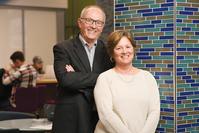IE alum hopes to see more industrial engineers enter medical fields
That IE advantage — one that he and his wife, Diane, believe can benefit many others — explains their $1.5 million estate gift to the School of Industrial Engineering. The Dumbaulds are keenly aware of how important attracting and keeping world-class faculty and talented graduate students are to Purdue IE and to the school's continued vision of re-thinking IE, especially in ways that can benefit health care systems. The flexibility of their estate gift will provide the school the means to excel in addressing these initiatives.
"Medicine is such a natural fit for an engineer," says Steve (BSIE 1972), a retired nephrology specialist. "When you are looking at a person who is sick, it is a matter of problem-solving. You take the data you have and figure out what the heck is going on. Then you figure out what you are going to do about it."
Tackling health care systems
Equally important to the Dumbaulds is how Purdue-educated industrial engineers can improve the information systems governing health care. As a retired nurse practitioner, Diane echoes Steve's concerns. They both know the problems inherent to insurance coding, and to software systems that do not communicate, and they agree that those problems result in compromised patient care and skyrocketing costs.
"These insurance-coding systems are onerous to operate. They take your attention away from the patient," Steve says. He explains that physicians spend valuable time during patient exams searching their screens for bullet points that reflect the exam's activities and conversation. "The screens often are not very intuitive. Many are poorly designed."
Software system incompatibility when sharing patient information adds to the problem.
"Systems don't communicate with each other," Steve says. "To communicate, they have to write interfaces. There can be 50,000 discrete data items, so people have to be hired to create interfaces, and that becomes extraordinarily expensive."
Both Dumbaulds now volunteer at a free clinic in Cincinnati. They say they are grateful to be able to focus solely on patient care now. Their freedom from bureaucratic burdens, however, has not diminished their desire to help improve the data systems in health care.
"I think Purdue Industrial Engineering could really make some major contributions in this area," Steve says. "The big thing will be to decide what data are important and establish ways to quantify those accurately. We need to see information across hospitals and across systems. It is huge. It affects every person in the U.S., let alone the world. It is difficult to do, but with engineers on the task, I believe it can be done."

